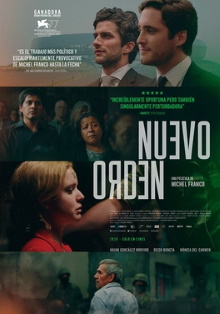This Mexican film is dystopian enough to count as science-fiction and another indicator is how its characters are increasingly sidelined as they are overtaken by the plot. Walking into this blind, it is shocking to watch the comfortable lives of the moneyed elite being disrupted and then destroyed by an increasingly violent riot by the masses of the poor underclass. Yet instead of seriously engaging with the morality of both sides, the film pivots away to blame the military instead. This thoroughly ruins its credibility and with it any chance of treating it as a serious film.
A lavish wedding party gets underway in large, modern mansion and it quickly becomes evident that the attendees are the elite of Mexican society. Marianne is the bride and her father is a business magnate who isn’t above dealing with bribes while her husband is an architect. An old servant of the family shows up however to ask for a loan as his wife Elsa urgently needs surgery. Marianne’s mother gathers some cash and tries to send him away but it isn’t enough. Marianne is more sympathetic and sets out with her driver Daniel with her bank card to get to Elsa’s house. But outside of their enclave, the city has been plunged into chaos by riots and the army is unable to keep control. Daniel brings Marianne to his neighborhood to keep her safe while the mansion is attacked by rioters including some of the servants employed by the family. They loot the house and kill some of the attendees. The next morning, Daniel leaves the house to see what is going on and is accosted by soldiers. He tells them about Marianne and they take her into custody. Meanwhile the army reasserts control over the country with curfews and other harsh security measures.
This is another film that seems promising at first as it spends considerable time on the wedding party to establish the personalities of the members of the rich family. But once the violence starts, director Michel Franco’s true intent becomes obvious: to deliver maximum shock value. It certainly is effective as the protesters disrupt the party by climbing over the wall and then prove to be armed by casually shooting anyone who tries to shoo them away. Soon enough it degenerates to uncontrolled violence and looting with the servants grinning madly as they lay their hands on the jewelry and expensive clothing around them, and just gets worse from there. But after the paroxysm of violence, instead of dealing with the aftermath, the film just moves on to more horror. The military rapidly turns the country into a police state and the soldiers that have Marianne abuse her instead of returning her to her family. The film has no interest in examining the culpability of the rich in creating such an unequal society or the poor in resorting to such extreme violence to get what they want. Instead the military proves to be worse than both and perhaps might even have engineered the uprising to impose a dictatorship on the country.
But if that is the real story the film wants to tell, its structure fails at it. It develops of characters of Marianne and Daniel, but then takes away all agency from them as they become victims of the plot. This means that all of the character development is only to engender our sympathy so that we care about what happens to them. The film suggests that the military is behind everything, deliberately doing nothing to stop the developing riots in order to later justify imposing a dictatorship. If so, then their leaders are the characters with agency in the story and the film should have included their perspectives from the beginning. The director however chooses to dispense with this in preference of shocking the audience and to avoid difficult questions about the worldbuilding. Certainly if I were part of the ultra-rich as depicted here, I would hesitate to trust the military that has already failed so spectacularly at their jobs. If nothing else I would flee with whatever wealth I can gather or else build a private security force of my own.
This film was notable enough to be shown at the Venice Film Festival and it certainly makes for a powerful statement about the class divide in Mexico that is also a race divide. But beyond indulging in the fantasy of the underclass rising up to attack the moneyed elite, a niche that is thoroughly filled by the awful The Purge franchise, this film has very little worth commending it for.
